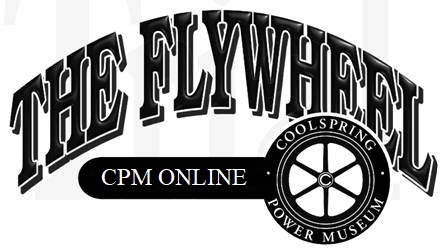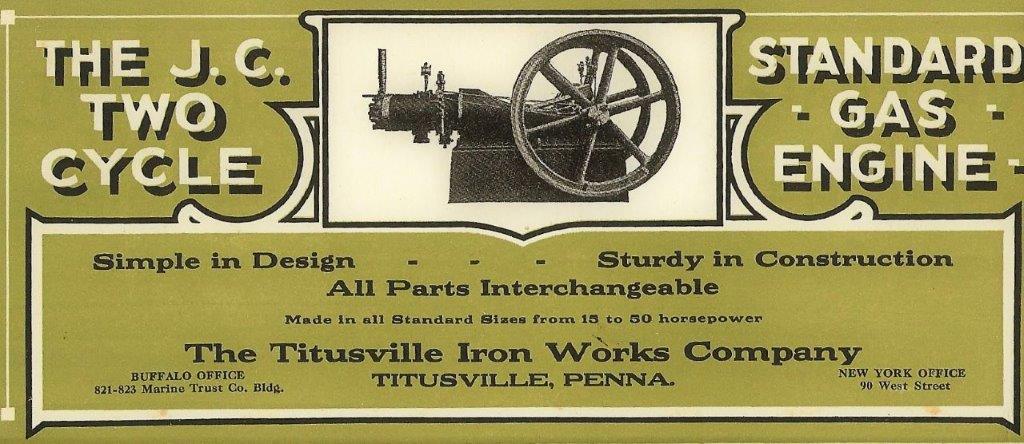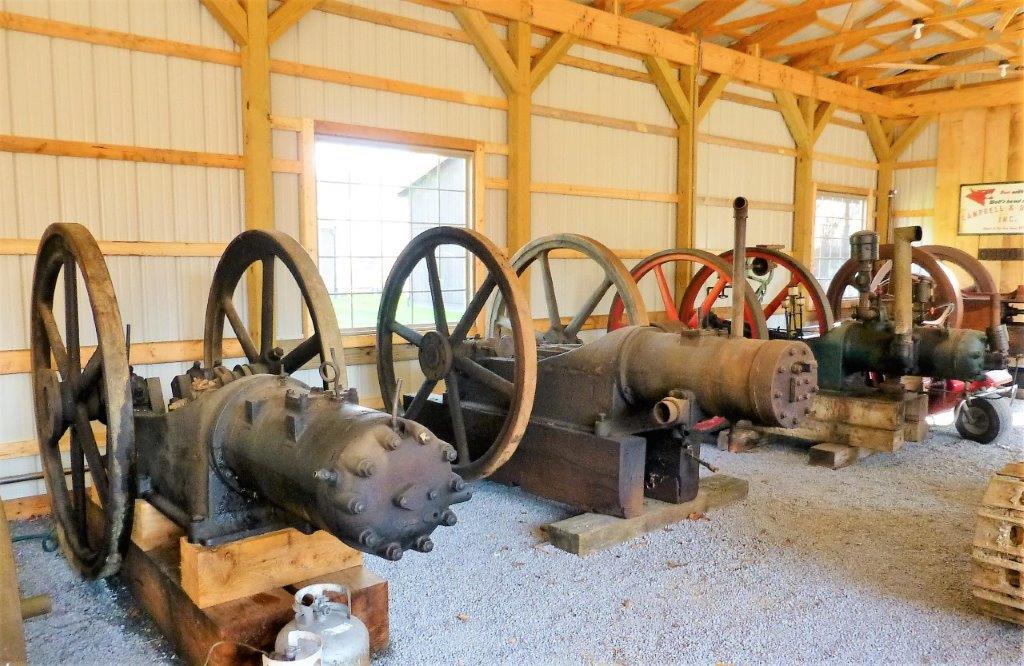
October 2022
JC Engine Memories
By Paul Harvey
As I was lacing the governor belt for my JC engine that
Steve Hogle and so many others are restoring for both me and CPM, I had
to reflect a bit why this engine is so special to me. Many fond memories
flowed by! Gosh, the engine has been here half a century and it has not
had any attention. It certainly needs some care and it needs to live
again. So, let’s time travel a bit to explore this engine’s history, as
well as my affinity to the JC. It will be a good journey!
But first, what is a JC? In the early 1900s there was a
big oil boom in Western Pennsylvania, and everyone wanted their part of
the pie. Titusville Iron Works was already building their version of the
Olin engine but, being a four-cycle design, it could be cantankerous.
Noting the success of the two-cycle Bessemer, Titusville president James
Curtis McKinney had his company design a similar engine. His brothers
were also involved with engine design. John Luke McKinney was involved
with the South Penn engine and Harry B. McKinney with the Ball. The
Titusville engine came upon the market in 1906 and was dubbed the JC,
honoring the president. It became a success.

Now we will travel back to 1967 to land in Morgantown,
West Virginia, and the oil fields just west of there. I was entering my
third year of medical school at West Virginia University, which would be
the clinical rotations in the hospital. Wow, the long years of didactic
classroom study were over. I had some free time! So, what to do? Hmm,
seems like exploring for old engines would be fun! So, I did.
I acquired my first little engine in 1958 when I was a
sophomore in high school. It was a 1˝ hp Hercules, and I had gotten a
few others. All were typical small farm engines. Now picture driving
west of Morgantown one evening on Route 7 and seeing an oil derrick
beside the road. OK, let’s have a look. Wow, that engine is huge - a 20
hp Bessemer. But I had never seen anything like it before. Looks like
there is a lot of exploring to do!
I soon made friends with Willis Yost, manager of the
Washington Oil Company’s interests in the Core, West Virginia, area. He
was a gentle man, and I was invited to have dinner with him and his wife
many times. After dinner, he sure could spin some yarns about the local
oil fields and his pumping experiences. All such good memories from my
good old days! Soon, he introduced me to one of his pumpers, Les Neely.
Skipping school some mornings, I would meet Les in Core and he would
take me on his pumping rounds in his old four-cylinder Scout. Seemed
that it could climb any hill and ford any stream! We would eat our
sandwiches beside a well and he would point out the exhaust notes from
engines he had started at other wells. He could tell when a well “pumped
off” and the engine needed to be shut down!
One morning Les told me to start the engine. Gosh,
really? Yes! It was a 20 hp JC on a hill overlooking Core. I knew the
procedure so I began by turning on the water, filling the oilers,
lighting the hot tube, checking for any problems, then back kicking into
compression. It immediately came into life! Getting it throttled in, I
finally engaged the clutch and watched the huge wooden wheel begin to
rotate. Finally, I walked out to the derrick floor to make sure the well
was pumping. Yep, all done just right. Les was smiling. Utopia! That is
how my love for the JC began, and it never ended!
At that time, I was driving my old four-wheel drive
International pickup. It sure looked like an oil field truck. Some
summer evenings, after a grueling day at the hospital, I would drive out
to Core, stop to engage the hubs, pull the lever back into low range,
and climb the hill to “my JC.” Negotiating all the gulleys and wash
outs, I soon pulled close to that special well. Happily, I started the
engine and sat back on the “lazy bench” to enjoy! I did not engage the
clutch. I loved playing with the engine, and soon I could bounce it back
and forth, to run either one way or the other, with the gas cock. Yep,
it was two-cycle so quite happy. Seemed like we had a special
relationship and knew each other!
Soon dusk would be upon me, so time to get back to
reality. So relaxing, but now just a special memory. I shut down the
engine, drained the water, filled the oilers, and gave it a special wipe
down. Did anyone know what I was doing all summer? Mr. Yost did as he
could hear it run, and I’m sure Les did. No one said a word about it as
if it was my secret just with the JC. A wonder time long gone!
Now let’s travel to 1971 and land in Jefferson County,
Pennsylvania. Graduating from WVU in 1969 and completing a general
rotating internship at Washington Hospital in 1970, I returned to my
home in Coolspring to open a medical practice in Brookville. So, in my
limited spare time, I began exploring the oil fields just north of home.
Hmm, sounds like the way to go. And so I did.
My practice of medicine became successful so I had the
Big Barn built, now known as the Power Technology Building, and had the
Engine House completed, now known as the Founders Engine House. I had a
1946 Reo winch truck and was ready for big game. I decided that I would
explore the area just north of Heath Station. I had been visiting the
six majestic Snow engines there for years. The engineers there told me
of a rod line power house on the hill a mile or so north of the station.
Great! But it was winter and lots of snow. I trudged the deep snow for
nearly a mile to find it. I entered and was greeted by a 20 hp JC. Looks
like old times! Next summer it came home!

I unloaded it with such good intentions, but so much
else was happening. Maybe tomorrow? No, busy at office. Next day?
Something else to bring home. So, the JC waited. It was sadly neglected.
Finally, I had it included in the Engine Wonderland building to meet its
cousins, the South Penn and the Ball. All in a row. It was happy. Then
Steve started to perform his magic. It is happening. The JC will soon
live again. A dream fulfilled! A rush of memories. The engine and I are
well satisfied.